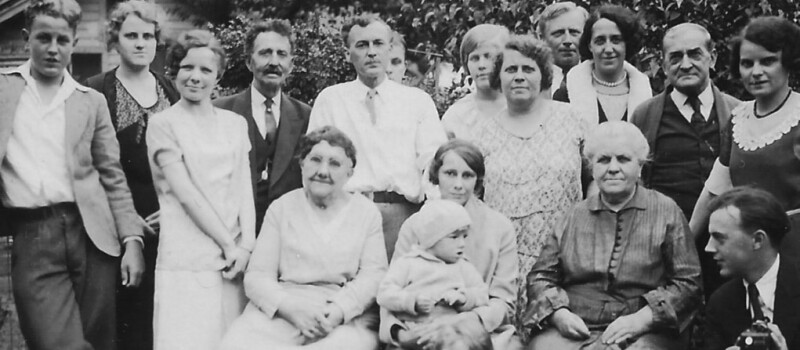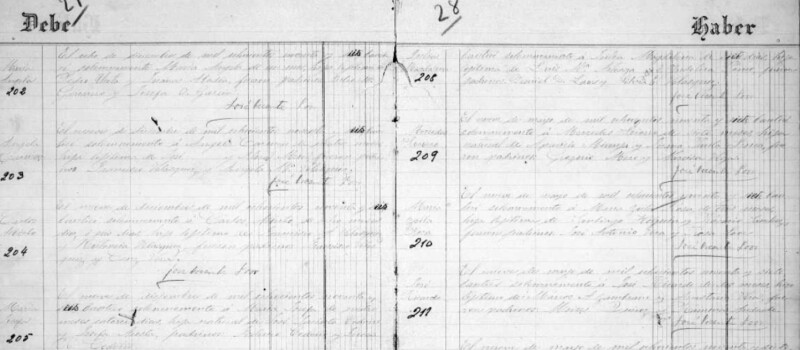The concept of transgenerational family matters has become an increasingly relevant topic in psychology and family life. Considering transgenerational patterns is thought to be helpful with addressing deep problems that could affect families over time.
We will explore what the word transgenerational means, examples of transgenerational characteristics, what constitutes a transgenerational problem, what transgenerational therapy entails, and how transgenerational studies are thought to benefit families.
Plus, we'll show you ways to record and discover more about your family using FamilySearch's Family Tree tool—including ways to look for transgenerational patterns. Keep reading to learn more!
What Does the Word Transgenerational Mean?
Transgenerational refers to patterns, beliefs, traits, and behaviors that are passed from one generation to another within a family. These elements can influence the way people relate, make decisions, and face challenges throughout their lives.
What Are Transgenerational Characteristics and Patterns?

As you hear about or research family stories, you might notice patterns and beliefs that stretch across generations of a family. These patterns might be subconscious or intentional.
Transgenerational patterns might include:
- Families choosing to have a similar number of children from one generation to the next
- Strong, independent women or mothers, or strong and independent men or fathers
- A grandparent-child-grandchild pattern of resilience in the face of trial or adversity
- A behavioral tendency, such as anxiety, shyness, confidence, or bravery in family lines
- Certain eating habits, schedules, or how generations view food
- Religious beliefs that have influenced the character or actions across multiple generations
- Superstitions or other family traditions
What Is a Transgenerational Problem or Trauma?

A transgenerational problem or issue can manifest itself in many ways, but generally involves patterns of behavior, beliefs, or conflicts that are perpetuated across generations and have negative or undesired consequences.
Transgenerational trauma, a similar term, usually refers to passing the effects of a traumatic event from one generation to the next, which can be done subconsciously or unintentionally.
Identifying a transgenerational problem or trauma and learning more about events that could have caused it initially are steps to consider in addressing and healing these types of issues.
Transgenerational issues can manifest in a variety of ways, such as:
- Recurring family conflicts
- Patterns of verbal or physical violence
- Challenges with mental health or addiction
- Traumatic events that have affected multiple generations (such as behavioral patterns stemming from war, economic difficulties, loss and death, or other family-specific tragedies)
Understanding and addressing these dynamics can be important to promote emotional health and harmony in the family. Studying past events that have affected family members can also help individuals come to understand past and present family members better.
What Is Transgenerational Therapy?

Transgenerational therapy is a therapeutic approach that focuses on identifying and addressing influences and traumas passed from one generation to another. It is based on the idea that family problems and dysfunctional dynamics can be traced back to traumatic events or behavioral patterns in previous generations.
Some common therapeutic approaches to healing transgenerational trauma include cognitive behavioral therapy, exposure therapy, art therapy, and family constellation therapy. These methods are believed by some to help people release repressed emotions, process traumatic events from the past, change negative thought patterns, heal deep emotional wounds, and enable reconciliation in divided families.
Transgenerational therapy can provide a safe space to explore and understand family patterns and traumas that may be affecting current life, and it potentially disrupts any destructive patterns and promotes a deeper understanding of family history to achieve healing.
How Can Transgenerational Studies Benefit My Family?

Studies suggest that “children with greater knowledge about their family history…have higher self-esteem, emotional health, and happiness” (Arielle Schwartz, par. 6). Studies have also shown that learning about your family’s past can give you greater resilience to face life challenges. Studying patterns that transcend different generations of your family’s history may also be of great benefit.
Discovering transgenerational patterns can instill a sense of belonging and even fulfillment, helping you and other family members find a sense of connection to your ancestors and better understand the unique roles you play in your family.
Uncovering these stories can also help you acknowledge both your family’s accomplishments and hardships, which “enhances emotional health and facilitates resilience in both adults and children”(Arielle Schwartz, par. 1).
By identifying certain patterns and influences, individuals and families can take steps to change any harmful behaviors and improve relationships with each other.
It can be hard for family members to talk about difficult or traumatic events, and it is key to remember that discussing such topics should be handled sensitively and delicately. Approach family members with compassion and respect, and with understanding as the end goal. Some family members may find healing and help from researching and discussing past family traumas. Others may not wish to.
How to Record and Discover Your Family History with FamilySearch

Transgenerational patterns can influence relationships, emotional well-being, and the overall future of a family. Transgenerational studies might offer a path to understanding and healing these dynamics, while FamilySearch gives you tools to record and share your discoveries.
Focus First on the Nearest Generations
Researching your family history can help you study transgenerational patterns. Examining patterns in your generation and in the generations right above and below yours is usually easier, since these are the generations you interact with most and have the most information about.
However, spending time learning about generations even further back can help you see how far patterns extend or even explore patterns in your family that are isolated to only a couple generations (and uncover reasons why).
Record What You Know
Start with what you know about your family, and record the stories you already have access to. Your own stories are important and could help future generations trace back their own habits and behaviors. You can organize and record these stories using a genealogy service like FamilySearch.org. (FamilySearch is completely free to use. More on that below.)
See if Stories Are Waiting for You
Your own family’s personal documents and records may hold more than you think! If there are family books, journals, letters, or memorabilia somewhere that you can access, look through those and consider scanning them so you can have a digital copy.
Collaborative family history sites or sites that allow searching or sharing family trees are another place to find stories and information about ancestors that other family members have already discovered or recorded. On FamilySearch, try doing a simple search or connecting to the public FamilySearch Family Tree to see what information is available.
Talk to Other Family Members
Another important asset when it comes to discovering family patterns is, well, your family! When safe to do so, conducting informational interviews with family members, especially living grandparents or even great-grandparents, can give you more context on your family’s story and your own.
More Extensive Research
Beyond living and deceased ancestors’ stories, you can search records yourself through FamilySearch and other genealogy sites to find information, plan a genealogy trip to ancestral homelands, or work with a genealogy professional to help you connect the dots.
Using the Family Tree to Do Transgenerational and Other Types of Family History Analysis

If you want to explore and record patterns that transcend generations in your family, FamilySearch offers an important tool: the Family Tree. This type of analysis is not practical without a way to organize family information. You can use this genealogical tool to learn about your family and make notes about what you find. It can help you track and document your family's history, including any relevant information about transgenerational patterns and challenges ancestors may have experienced.
Here are some steps to get started:
- Visit the Family Tree page, and click Start Your Tree. If you don't have an account yet, sign up for FamilySearch for free.
- Build your family tree: Add information about your relatives, including names and dates of births, marriages, and deaths. FamilySearch will help you see if there is already information about those relatives in the Tree as you input what you know.
- Add stories and notes: Use the stories and notes features to record details about your family members' lives, including any cross-generational patterns issues you identify. Describe significant events that have affected and influenced your family.
- You can also use the different views on the Family Tree and the historical maps and time line features to study each generation in context of the history going on around them.
By sharing and documenting this information on FamilySearch, you can contribute to the understanding of your family history and may be opening the door to important conversations about healing and growth. Don't hesitate to start your journey of family discovery.
Related Articles
At FamilySearch, we care about connecting you with your family, and we provide fun discovery experiences and family history services for free. Why? Because we cherish families and believe that connecting generations can improve our lives now and forever. We are a nonprofit organization sponsored by The Church of Jesus Christ of Latter-day Saints. To learn more about our beliefs, click here.




